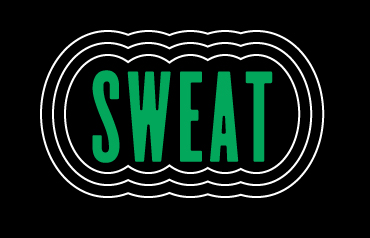 Sweat: The Fire and Fury of Frustration
Sweat: The Fire and Fury of Frustration
@PublicTheaterNY
by Ross
A lady said to me after Sweat at the Public Theater, “If Hillary had seen this play, maybe the Election would have had a different outcome”. It’s a captivating question that exemplifies all that this play is fueled by. I totally understand where she’s coming from although I have a feeling the response is a lot more complicated then the statement. Most of these characters are the ones, enflamed by rage and frustration, saying hateful things while claiming not to be racist, who voted for that ‘man’ on Election Day. It’s an upsetting experience to watch – so sad, while also being

illuminating. Such frustration and fear turned on another, because someone doesn’t know what else to do with those feelings. It’s difficult watching them suffer and act on that frustration, fired up by the rhetoric that was used to his advantage. Stan, the bartender where they all like to gather (a gruff detailed performance by James Colby) does say, “the writing is on the wall”, but no one wants to read it. I’d say that is true for many trying to hold on to a feeling of entitlement and old school ideas in this modern economy. And there is lopsided truth in their cries. We want to empathize with their loss and struggle, but the subtle entitlement and racism gets in the way.
So the question I’m struggling with in this moment is, how to write about a play when all it’s doing is stirring up these complicated thoughts? When I went to see the last of the three Gabriel Family plays (also downtown at the Public; check out my review: https://frontmezzjunkies.com/2016/12/10/women-of-a-certain-age-the-gabriels-election-night-dread/ ) I dreaded having the Election Night horror laid out before me a second time. I didn’t want to relive that horrific night over again, but it turned out that
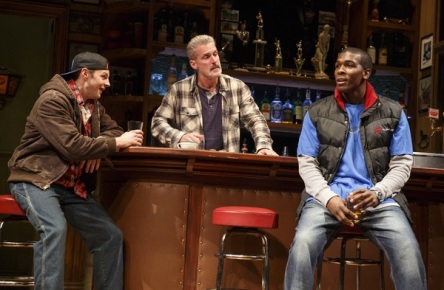
Women of a Certain Age was comforting, like a warm family quilt, as I got to hang out with like minded souls who believed in the same things I do. With characters who also couldn’t fathom anything other than Hillary as our next President. Sweat was the one I should have been dreading. Don’t get me wrong, it’s a triumph of a production, superbly written by Lynn Nottage, directed impeccably by Kate Whoriskey, beautifully staged (scenic: John Lee Beatty; lighting: Peter Kazorowski; costumes: Jennifer Moeller) and performed (and very deserving of the Broadway transfer to the amazing Studio 54 Theater), but what surprised me the most, was how disturbing it was to sit through. And how it dredged up all the emotions that are so difficult and complicated to re-experience.
 So setting that aside for the moment, Sweat, the intense and riveting examination of those left behind in this global economy, is masterful. The ensemble strives for an authentic feel as we look into the rocky terrain that exists in the manufacturing and union job world that exists way outside the liberal bubble we live in. All of the actors are spectacular in their portrayals giving us a glimpse into the reactive and frustrated mind of these struggling men and women, no holds barred.
So setting that aside for the moment, Sweat, the intense and riveting examination of those left behind in this global economy, is masterful. The ensemble strives for an authentic feel as we look into the rocky terrain that exists in the manufacturing and union job world that exists way outside the liberal bubble we live in. All of the actors are spectacular in their portrayals giving us a glimpse into the reactive and frustrated mind of these struggling men and women, no holds barred. The first moments of the play flip back and forth from a parole officer (Lance Coadie Williams) speaking separately with two young men in 2008. Both have committed a crime eight years prior and have been released. A crime that we aren’t going to be privy to the details just yet. Over on one side, in one office, we have the defiant ‘angry young white man’, Jason (an intense Will Pullen) clearly struggling to see any way out of his predicament besides returning to his previous scenario, if that’s even possible. In the other office, we see a sorrowful young black man, Chris (a devastatingly good Khris Davis), who feels ashamed and guilty of the terrible thing that happened; he sadly states, “a couple minutes, and your whole life changes”. In him, we see a struggle to find his way beyond his past, and a deep desire for something else, if that’s even possible.
The first moments of the play flip back and forth from a parole officer (Lance Coadie Williams) speaking separately with two young men in 2008. Both have committed a crime eight years prior and have been released. A crime that we aren’t going to be privy to the details just yet. Over on one side, in one office, we have the defiant ‘angry young white man’, Jason (an intense Will Pullen) clearly struggling to see any way out of his predicament besides returning to his previous scenario, if that’s even possible. In the other office, we see a sorrowful young black man, Chris (a devastatingly good Khris Davis), who feels ashamed and guilty of the terrible thing that happened; he sadly states, “a couple minutes, and your whole life changes”. In him, we see a struggle to find his way beyond his past, and a deep desire for something else, if that’s even possible.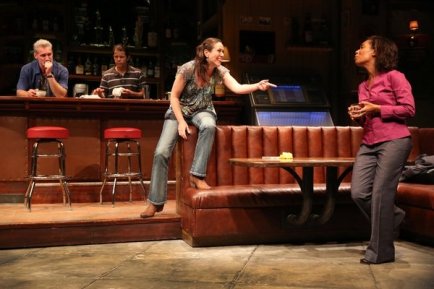 The set up is clear, especially when we shift to the year 2000, and we find ourselves in the factory town of Reading, PA, on a journey back to discover what happened to these two young men. We join the factory workers in a bar; celebrating birthdays, unwinding after a shift on the floor of the steel tubing factory they all have worked years at, and/or contemplating their individual futures over a beer. Jessie (a fantastically messy Miriam Shor) obviously does this way too much, and is just trying to cope (she has a wonderfully powerful scene talking about the slow demise of a dream), but some of these characters still have dreams, some plans, while others, just want to survive their lives. Tracey (Johanna Day giving us a tightly wound ball of discomfort) and her son, Jason see comfort in continuing the family tradition of working on the floor until retirement. Cynthia (a detailed and strong Michelle Wilson) and her son, Chris, seem to have the seed of advancement in their souls, and dream of moving up or moving beyond. Stan, the bartender at their watering hole, used to be on the same factory line, but an injury set him off track; free of the factory but confined to working the rest of his days in that bar. He’s just trying to do the best he can, for as long as he can.
The set up is clear, especially when we shift to the year 2000, and we find ourselves in the factory town of Reading, PA, on a journey back to discover what happened to these two young men. We join the factory workers in a bar; celebrating birthdays, unwinding after a shift on the floor of the steel tubing factory they all have worked years at, and/or contemplating their individual futures over a beer. Jessie (a fantastically messy Miriam Shor) obviously does this way too much, and is just trying to cope (she has a wonderfully powerful scene talking about the slow demise of a dream), but some of these characters still have dreams, some plans, while others, just want to survive their lives. Tracey (Johanna Day giving us a tightly wound ball of discomfort) and her son, Jason see comfort in continuing the family tradition of working on the floor until retirement. Cynthia (a detailed and strong Michelle Wilson) and her son, Chris, seem to have the seed of advancement in their souls, and dream of moving up or moving beyond. Stan, the bartender at their watering hole, used to be on the same factory line, but an injury set him off track; free of the factory but confined to working the rest of his days in that bar. He’s just trying to do the best he can, for as long as he can.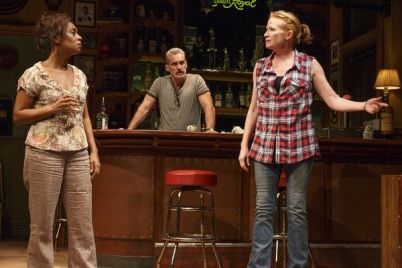 They are family, these people. They work the line together and think they understand one another. What becomes clear is that their bonds are fragile and when the balance is upset, the gloves come off. Cynthia is the first to throw the alignment off. She gets promoted into management. It seems no one ever gets promoted from the floor to management, but she does, and in her breaking of that barrier, the loyalties crumble. Tracey, who at first doesn’t believe in setting sights beyond the generational worker role norm, tries and then fails to get the promotion. Instead of being happy for her friend’s success (over her), the distrust of management encroaches and ultimately, the unconscious envy puts a wedge in-between them and their friendship. Tracey has no other way to cope, except to turn on her friend, expressing the idea that she only got the promotion because she’s black. And with that statement, the fire gets lit.
They are family, these people. They work the line together and think they understand one another. What becomes clear is that their bonds are fragile and when the balance is upset, the gloves come off. Cynthia is the first to throw the alignment off. She gets promoted into management. It seems no one ever gets promoted from the floor to management, but she does, and in her breaking of that barrier, the loyalties crumble. Tracey, who at first doesn’t believe in setting sights beyond the generational worker role norm, tries and then fails to get the promotion. Instead of being happy for her friend’s success (over her), the distrust of management encroaches and ultimately, the unconscious envy puts a wedge in-between them and their friendship. Tracey has no other way to cope, except to turn on her friend, expressing the idea that she only got the promotion because she’s black. And with that statement, the fire gets lit. There is a very telling and exquisitely written scene between Tracey and Oscar (a quietly brilliant Carlo Alban) that shines an uncomfortably bright light on the underlying racism that exists in the worker’s frustration. She explains to Oscar, who she first refers to as a Puerto Rican (he corrects her with a subtle defiant, “I’m Colombian”), why he doesn’t deserve to work at the factory. “You weren’t born here”. “Yes I was”. “Well, you weren’t born in this town”. “Yes I was”. “Well, my grandfather and my father worked in that factory, as I do, and my son does”. (forgive me if I don’t have the exact dialogue word for word). In Tracey’s mind this is not racism, just facts; her entitlement. It doesn’t help that she refers to Spanish as ‘gibberish’, and that earlier, Tracey assumes Oscar, naturally, would know someone who is an arsonist. Because, well, you know…
There is a very telling and exquisitely written scene between Tracey and Oscar (a quietly brilliant Carlo Alban) that shines an uncomfortably bright light on the underlying racism that exists in the worker’s frustration. She explains to Oscar, who she first refers to as a Puerto Rican (he corrects her with a subtle defiant, “I’m Colombian”), why he doesn’t deserve to work at the factory. “You weren’t born here”. “Yes I was”. “Well, you weren’t born in this town”. “Yes I was”. “Well, my grandfather and my father worked in that factory, as I do, and my son does”. (forgive me if I don’t have the exact dialogue word for word). In Tracey’s mind this is not racism, just facts; her entitlement. It doesn’t help that she refers to Spanish as ‘gibberish’, and that earlier, Tracey assumes Oscar, naturally, would know someone who is an arsonist. Because, well, you know…Once the factory locks out the union workers, the fire that was just a small flicker becomes

wild, and someone is bound to get scorched. The lock-out throws all into a chaotic free fall, something that happened previously at a local textile factory, sending Cynthia’s husband, Brucie (an excellent John Earl Jelks) out onto the streets and into the realm of drug use and finally addiction and homelessness. We all know that something terrible is going to happen, especially when it is clear that Oscar plans on crossing the picket line to take a non-union job at a pay much lower than union scale. It doesn’t matter that it pays a great deal more then he makes at the bar, Oscar, and Cynthia become the targets of the unmoored rage. Violence will be the result, but it is surprising what the final outcome is. It’s a heavy hand to bare witness to, especially after how it appears this Election went.
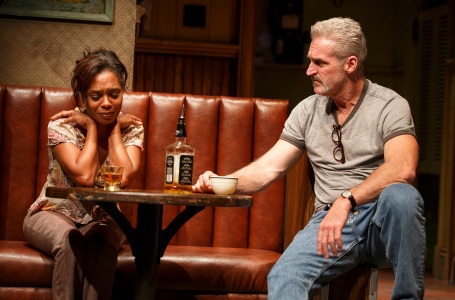 The Public Theatre is pulling out all the stops this fall. Giving us fire, frustration, revolution, and quiet anxious unease. Almost every production I’ve seen is triggering all sorts of reactions circling around the election. One can’t help but wonder, after watching Sweat, Party People, or any one of The Gabriels at the Public Theatre, how would any of these productions resonated a year ago, or even a month ago before Election Day. So many of the productions at the Public feel like that. Uncomfortable. Insightful. Those of us inside the liberal bubble of NYC that didn’t see how this Election would eventually turn out are also guilty of not wanting to read the writing on the proverbial wall. And now it’s us who are angry and frustrated. Who will we turn on? What will we do with our anger at where we see this country going? It’s a fair question to ask, one that Sweat begs us to question.
The Public Theatre is pulling out all the stops this fall. Giving us fire, frustration, revolution, and quiet anxious unease. Almost every production I’ve seen is triggering all sorts of reactions circling around the election. One can’t help but wonder, after watching Sweat, Party People, or any one of The Gabriels at the Public Theatre, how would any of these productions resonated a year ago, or even a month ago before Election Day. So many of the productions at the Public feel like that. Uncomfortable. Insightful. Those of us inside the liberal bubble of NYC that didn’t see how this Election would eventually turn out are also guilty of not wanting to read the writing on the proverbial wall. And now it’s us who are angry and frustrated. Who will we turn on? What will we do with our anger at where we see this country going? It’s a fair question to ask, one that Sweat begs us to question.









[…] Sweat: The Fire and Fury of Frustration […]
LikeLike
[…] , but with news of Sweat [opening Mar. 26] (https://frontmezzjunkies.com/2016/12/13/sweat/) transferring to Roundabout’s Studio 54 theater, they have even more to celebrate. Over at […]
LikeLike
[…] Lead Actress in a Play Johanna Day, Sweat Jennifer Ehle, Oslo Jennifer Kidwell, Underground Railroad Game Kecia Lewis, Marie […]
LikeLike
[…] backdrop is magnificent, with scenic design by John Lee Beatty (Public’s Sweat), obvious but detailed costuming by Jane Greenwood (MTC’s The Little Foxes), dynamic lighting […]
LikeLike
[…] Sosa (Public’s Miss You Like Hell) Lighting Design Peter Kaczorowski (Public’s Sweat) Sound Design Jessica Paz (Broadway’s Hadestown) Hair, Wig, and Make-Up Design Mia Neal […]
LikeLike